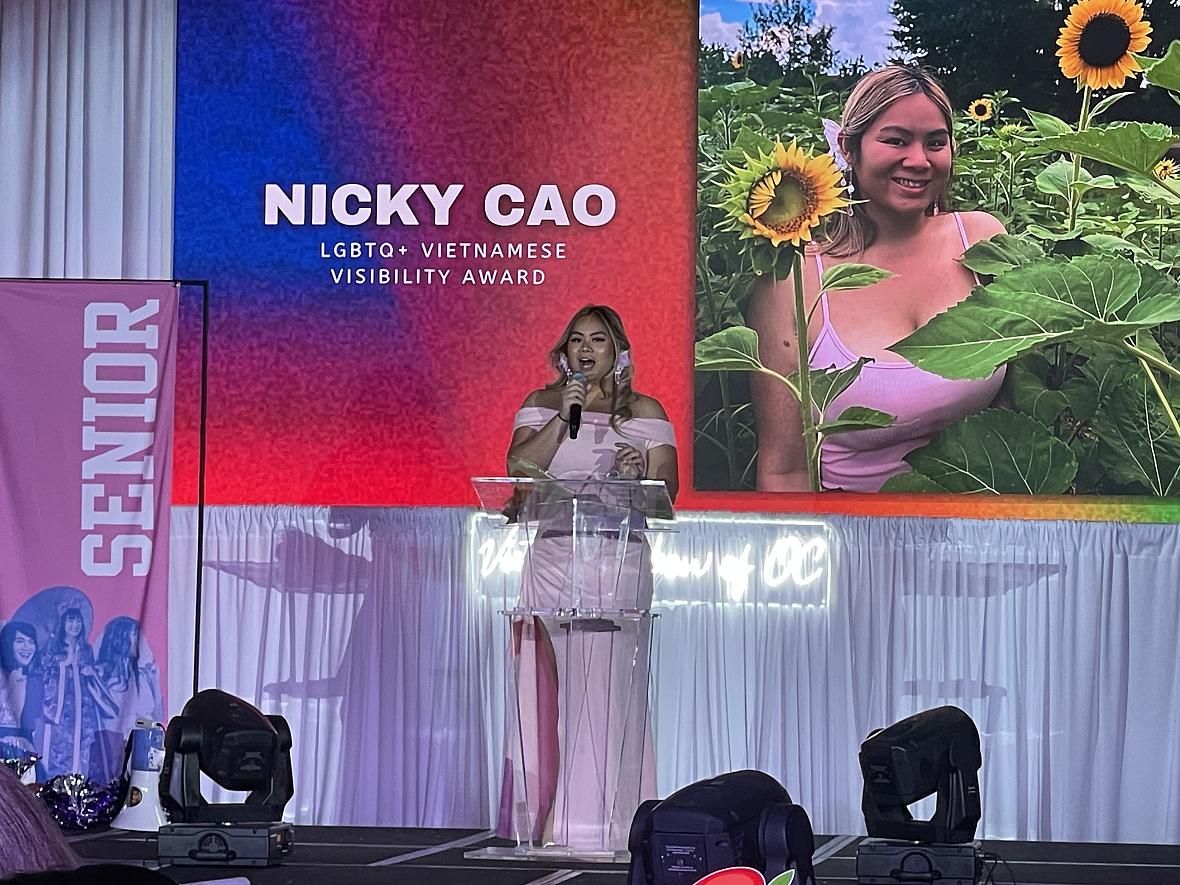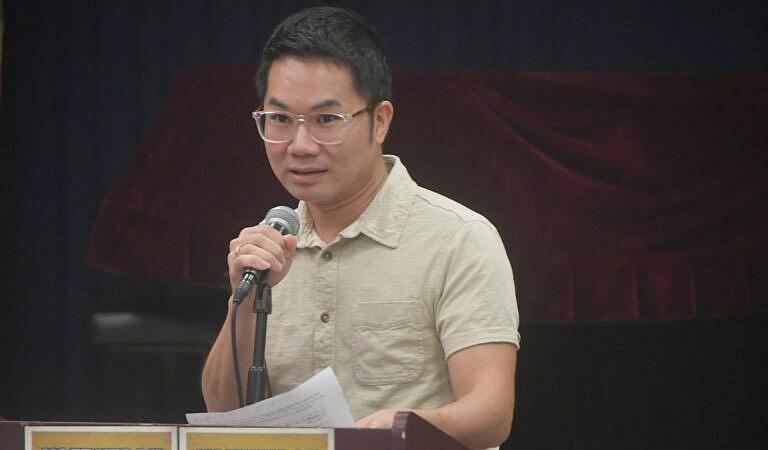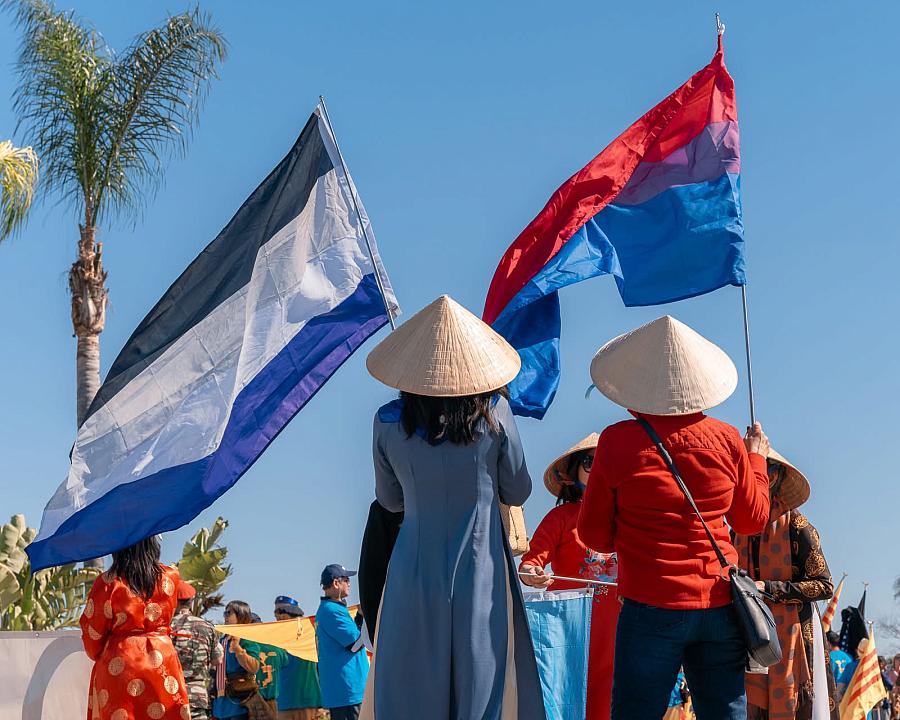An ‘Áo Dài’ of Her Own: One Trans Woman's Path to Family Acceptance
The story was co-published with Nguoi Viet Daily News as part of the 2025 Ethnic Media Collaborative, Healing California.

Nicky Cao during VROC Gala in October after receiving “The Lotus Dao Trailblazer Award.” (Photo: Nhien Tra Nguyen)
When Nicky Cao was born, her parents had already survived a war, crossed an ocean, and started over in a part of New Orleans East known to Vietnamese refugees as Versailles. She is the 14th of 15 children.
“My parents were refugees from the Vietnam War,” she said. “I grew up in poverty.
“I’m queer, I’m transgender,” she said. “I started my transition medically at 18, when I could finally get access to hormones on my own. My parents weren’t really accepting at first, so I was kind of on my own right off the bat.”
Across the country, access to transgender healthcare is shrinking as new federal restrictions and state-level bans take hold. Major health systems - including Kaiser Permanente and Children’s Hospital Los Angeles - have recently paused or shuttered their gender-affirming surgery programs, and more than two dozen states now prohibit or limit care for trans youth.
Nicky had a few surgeries performed in Southern California with the first surgery around 2021, where she found a supportive community in Viet Rainbow of Orange County (VROC), an organization that works on LGBTQ visibility, safety, language access, and family acceptance in Vietnamese communities.
Now 27, Nicky is a Vietnamese transgender woman, a nursing student, and one of the few people in her community who will talk openly about her transition, her mental health, and her fear.
A minority within a minority
“It’s like being a minority within a minority. I’m queer and I’m trans. And being trans is already politicized here,” said Nicky.
That layered experience is exactly what worries Hieu Nguyen.

Hieu Nguyen is a licensed clinical social worker and independent nonprofit and healthcare consultant who specializes in LGBTQ mental health in Southern California. (Photo: Nguoi Viet Daily News)
Hieu is a licensed clinical social worker and independent nonprofit and healthcare consultant who specializes in LGBTQ mental health in Southern California. He is also a longtime Vietnamese community organizer and one of the founding leaders of VROC.
“What you see in any community is that marginalization stacks,” Hieu said. “It’s not just your sexual orientation. It’s your gender identity. It’s your racial and ethnic identity. All of those are under attack right now by this president and this administration – in policy, in rhetoric, and in practice.”
“And so not only do these communities have to deal with historical trauma,” he added. “They’re having to deal with the current trauma. All of that has a direct impact on their mental health, emotional health, psychological health. Their sense of safety and security. If your mental health is struggling, it affects your physical health. It’s all connected.”
At 18, with no parental support for transition and no emotional safety at home, Nicky was put on antidepressants.
“My parents didn’t support me being on hormones before 18, and they weren’t supportive of antidepressants either,” she said. “So right when I turned 18, I got on antidepressants and hormones at the same time.”
It was gender-affirming care – not prayer, not shame, not silence – that made her want to stay alive.
“Eventually I was able to get off the antidepressants,” she said. “The hormones gave me hope. It’s hard to see what you want to do with your life if you don’t feel comfortable with who you are. Hormones made me feel like eventually my body will be where my mind is. It gave me purpose.”
Hieu calls that word – purpose – a health outcome.
Hieu emphasizes that suicides and suicidal thoughts occur not because a young person is LGBTQ, but “because of the bullying they suffer. The lack of family acceptance. The discrimination. The harassment. The policies targeting them.”
“In the US, nearly 40% of youth experiencing homelessness are LGBTQ, even though LGBTQ youth are maybe 10% of the population,” he said. “Up to 40% of suicides are LGBTQ youth, even though we’re 5 or 10% of the population. That is disproportionate.”
Across the United States, transgender people make up only about 0.6 percent of the general population, yet they face disproportionate risks to their safety, housing, and health.
According to the U.S. Department of Housing and Urban Development’s 2018 Point-in-Time Count, 2,512 transgender people were experiencing homelessness, with more than half living unsheltered.
Nationally, 44 percent (1,100) of the transgender population experiencing homelessness were sheltered, while 56 percent (1412) were unsheltered. Fifty percent (1,252) of all transgender people experiencing homelessness were found in California. The Continuum of Care (CoC) with the highest number of transgender people was Los Angeles City and County with 919 people.
LGBTQ adults make up 9% of Los Angeles County’s adult population, approximately 665,000 LGBTQ adults. Fourteen percent of LGBTQ adults in the county are transgender or nonbinary, 13% are Asian.
“Just having one supportive adult – one adult who accepts your identity and loves you out loud – can decrease suicide risk by up to 40%. Just one adult,” Hieu said.
“That’s why family acceptance work matters. That’s why we never stopped doing that at VROC.”
At first my family wasn't accepting
For Nicky, that “one adult” turned out to be her mother eventually.
“At first my family wasn’t accepting,” Nicky said. “Some of my brothers were homophobic. They’d yell. They’d be mad about me being gay before I even had the language to say I was trans.”
Her sisters defended her early: “They were the first people I came out to.”
But it was her mother’s change of heart that still makes her emotional. Her mother died in 2020.
“Before she passed, she slowly became very accepting and loving,” Nicky said. “In Asian cultures we don’t really say ‘I love you.’ She didn’t used to say it. But then she started telling me she loved me. She even talked about, like, if we went back to Vietnam, she wanted to take me to get my own ‘áo dài’ made. I’m very grateful for that.”
The story also resonated with Hieu.
“I came out 20 years ago,” he said. “At first, my mom’s reaction was like her hopes and dreams for me were gone. There was a lot of struggle. But over time it got better. They accept me, they accept my husband, they see our love.”
“Acceptance doesn’t mean education is over. My mom still has misconceptions. She’ll still say certain words or talk like being gay means something is biologically wrong. I still correct her. We are still teaching,” he laughed.
Anti-trans messaging
In 2025, 28 states passed 123 anti-trans bills. California is not one of them.
On July 31, California Attorney General Rob Bonta filed a lawsuit against the Trump administration’s attacks on gender-affirming care.
Research shows that gender-affirming care can positively impact the mental health of transgender youth. Forcing young people to wait until they are 19 or older to start care allows symptoms of gender dysphoria to worsen, Bonta said.
In June, Stanford Medicine paused surgical procedures for people under 19. In July, Children’s Hospital Los Angeles closed its gender-affirming care center, forcing about 3,000 patients under 21 to look elsewhere for care. In August, Kaiser Permanente followed suit, but noted that hormone therapies would still be available.
A policy brief from the San Francisco Community Health Center, found that the United States had become “the world’s most restrictive developed democracy for transgender healthcare access,” with 25 states banning gender-affirming medical care for youth, directly affecting more than 120,400 trans young people.
Nicky’s route to surgeries – facial feminization, breast augmentation, body contouring – came through her job.
“Starbucks was the first job I ever had with trans-inclusive health care,” she said. “They paid for most of my surgeries. That really shaped who I am now.”
She’s still working there, even while in school, because she’s racing against the political clock.
“I want to get my voice surgery soon,” she said. “Honestly, I want to get all my surgeries before things get worse for us as trans people. The way the current administration is working, a lot of access is being stripped away. I’m scared they’re going to start policing hormones next.”
Hieu says that fear is not hypothetical.
“The most powerful office in the world is telling hospitals, universities, providers to stop giving gender-affirming care to trans people or they pull your funding,” he said, referring to the White House. “That is what’s happening. They are actively demanding that healthcare systems stop treating trans people.”
“It is very strong and it is very undemocratic,” Hieu stated.
He also warned that targeting healthcare is not random – it’s strategic.
“This is the same playbook we’ve seen in history,” he said. “You demonize a group. You make people see them as less than human. Once they’re not human to you, you feel justified denying them care, denying them dignity, denying them safety. We’ve seen this before.”
Culture, stigma, and confusion at home
“Culturally, a lot of people in our community still think LGBTQ is ‘not normal,’ or even a disease,” Hieu said. “We hear people still using words like ‘gay,’ like something you catch. That’s not just older people. That’s my own siblings sometimes. I still have to correct them,” Hieu said.
That stigma existed long before this moment. What’s different now, he said, is who is feeding it.
“It’s not just coming from some random neighbor,” he said. “It’s coming from the President. It’s coming from federal agencies. It’s coming from health officials.”
The effect, he said, is confusion where there should have been slow progress.
“Our community is still in the learning stage,” Hieu said. “They’re still trying to understand what LGBTQ even means. And in the middle of that fragile stage, they’re getting hit with messages of hate from the highest levels of government. It makes it harder. It sets us back. It makes people scared to even try to understand.”
Nicky confirms that impact in her body, in real time.
“I used to take little trips to Texas or Mississippi,” she said. “Now I don’t. I’m genuinely scared. A lot of Southern states are passing laws saying we can’t use bathrooms if they don’t match what’s on our birth certificate. I just don’t travel anymore.”
“I don’t go out unless it’s for work or school,” she said. “It’s a very scary time.”
“For trans people, for trans women of color especially, it’s not even about hopes and dreams right now,” Hieu said. “It’s about survival.”
“A lot of them are just trying to survive,” he said. “We want them to thrive. We want them to dream. But a lot of people barely feel like they can stay alive in public without being attacked.”
That difference – dream vs. survive – is where both health and policy live.
At the policy level
Both Nicky and Hieu describe solutions on two levels – systems and community.
From Hieu’s view as a clinician and health consultant, health systems and insurers have immediate responsibility.
“Insurance companies and public systems – like county agencies, like health plans – need to make sure people know how to access mental health support that speaks their language and understands LGBTQ identity,” he said.
“That means culturally competent providers. That means Vietnamese-speaking therapists who won’t shame you for being queer or trans. That means covering gender-affirming care without making people lie on paperwork.”
He also said it’s not enough to say “the law already protects you,” because those laws are being actively challenged.
Although California Governor Gavin Newsom signed several transgender privacy protection bills in October, he vetoed legislation that would have broadened access to hormone therapy by mandating health insurance coverage and requiring pharmacists to dispense a year of hormone therapy at a time to transgender patients.
In California, pharmacies can only dispense a 90-day supply. The bill, authored by state senator Caroline Menjivar, would have allowed 12-month supplies to anxious transgender patients especially when clinics and hospitals were closing or limiting gender-affirming services under federal government pressure.
“At a time when individuals are facing double-digit rate increases in their health care premiums across the nation, we must take great care to not enact policies that further drive up the cost of health care, no matter how well-intended,” Newsom wrote in his veto message.
“Nothing is safe,” Hieu said. “Even policies we thought were settled are under attack right now. But it is still better to have protections in place than to have nothing. We still need people in office who will defend those protections instead of tearing them down.”
The community of belonging
“What’s effective right now is making sure people feel like there is community,” Hieu said. “That they’re not alone. That they’re loved. That they belong. That someone will show up for them.”

VROC members during Tet Parade in 2024. (Photo: VROC)
Nicky saw what that looks like when she first connected with VROC in Southern California that does family acceptance work in Vietnamese, with Vietnamese parents.
“They met me early in my transition,” she said. “They taught me it’s okay to be Vietnamese and queer and trans. I didn’t have to pick one identity or feel like one part of me erased the other.”
“In SoCal, you have full Vietnamese queer and trans organizations. You have funding. You have a community.”
During the VROC Gala on October 17th, 2025, to celebrate the 12th anniversary of the organization, Nicky Cao proudly displayed the “The Lotus Dao Trailblazer Award” she received for her work on amplifying marginalized voices and fostering inclusivity.
“I used to feel like I had to choose – I’m either Vietnamese or I’m trans,” she said. “Now I know I don’t have to choose. I can be both.”
“I am both,” she whispered.
This project was supported by the USC Annenberg Center for Health Journalism, and is part of “Healing California”, a yearlong reporting Ethnic Media Collaborative venture with print, online and broadcast outlets across California.
